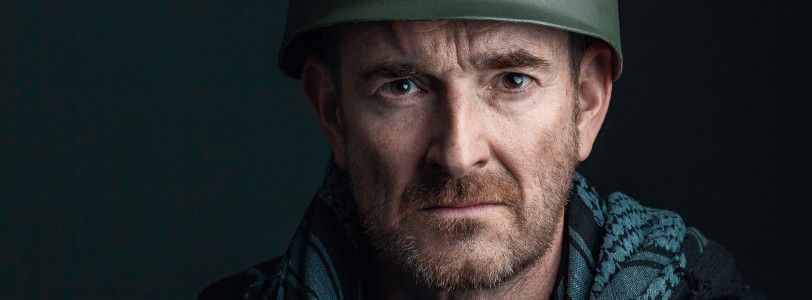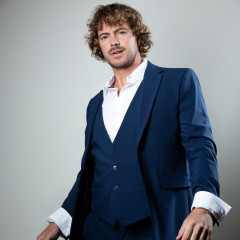Hello! Could you first introduce yourself to the reader?
Hello, Reader. My name is Henry Naylor. I am a playwright. And also a performer.
I’m doing a show this year at the fringe called Afghanistan Is Not Funny.
How would you describe your show?
The best description I’ve heard of it, is that it is a docu-play.
Basically it recounts the experiences that I, and photographer Sam Maynard, had when we visited Afghanistan back in 2002, straight after the war. It’s a bonkers true story, recounting how we were nearly blown up by a landmine, were threatened by a war criminal who told he was ‘going to make us disappear in the middle of the desert’… and were abducted by the Mujahedeen. It’s a ripping yarn, with a few laughs and a message.
Why do you want to perform at Edinburgh Festival Fringe?
A couple of reasons, I guess – one professional and one social.
I want to get this show out to as large an audience as possible. It’s a very personal story, and it has a humanitarian message I’m thoroughly committed to. And the Fringe is always great place to launch a new piece.
And socially: I love the Edinburgh fringe. It’s a great place to meet other artists. Artists are a weird bunch – we’re typically misfits and outsiders… but at the Fringe, our Tribe assembles. It’s great Fun.
What differentiates it from other festivals?
Size and influence, surely.
It’s about twice as big as its nearest rival. Massive. There are so many shows here, it’s impossible to keep tabs on them all. Sometimes you get back home and find out that one of your good friends was also playing the Fringe for the whole month… and you didn’t even realise it.
And in terms of influence... it’s a place where artists HAVE to perform. More than any other Fringe. Because it can be like the world’s greatest Arts Trade Fair. A great showcase. A place where you can get snapped up by promoters from across the globe. It’s a must.
What first motivated you to enter the industry? Who were your inspirations?
I kind of fell into it. Yeah, really. I was in University student review with Andy Parsons, which Griff Rhys Jones came to see. He liked our material and wanted to buy it from us to use on his TV show Alas Smith and Jones. We didn’t sell him our stuff – we wanted to keep it for ourselves – but we told him we’d be happy to write new stuff especially for their show..
And that’s how we got started.
Griff was lovely to us. He was very generous with his time, and he taught us how to write for TV. We got quite a bit of stuff on the show, and then got picked up by Spitting Image. That’s how I began writing satirical comedy.
How has your background, upbringing and education had an impact on your artistic career?
When you are writing plays you are trying to write about the human experience. So inevitably you start writing about events and feelings and experiences that you’ve had, then adapt them to fit certain characters and situations. When I wrote about a female Kurdish freedom fighter in the play Angel, I was also writing about myself. Her relationships with her family mirrored relationships within my own. It gave the story Truth. It’s how you give your characters relevance and meaning. It’s how you create human authenticity.
What is your earliest childhood art memory?
I remember drawing a toucan when I was only six years old, and for a six-year-old it was quite good. My dad was very excited about it. I’m sure his pride and encouragement shovelled me into an artistic career.
If you didn’t have your current job, what would you probably be doing?
I think I’d be a war correspondent. I’m a history graduate, and I’d get a kick out of witnessing global events first-hand. It’s one of the reasons why I went to Afghanistan straight after war to research my play. I was curious to see what the effects of war were really like.
Did Covid-19 change the way you create work? Do you approach shows with a different mentality now?
Massively. I think being in lockdown changed us all. We spent too much time in our own company. It was a period of enforced introspection, and self-examination. I suspect there’ll be a lot of solo shows, this year, where performers talk about themselves. It was certainly true at the Adelaide fringe. And I suspect it’ll be true in Edinburgh.
Me personally, I’m performing a solo show, for the first time in over 30 years of coming to the fringe. I wouldn’t have done it if I was working with a cast.
Describe the last year in 5 words or less?
Nightmarish and testing, but inspiring.
Do you subscribe to the idea that art should be exempt from ‘cancel culture’?
I’m a satirist. it’s my job to shoot down idiots with offensive views. If all the offensive idiots were cancelled – I’d be made redundant. Let them spout their nonsense, I say. I’m never busier, professionally, than when Morrissey is crapping on!!!
Seriously, I think everybody should be allowed to speak. If someone says something offensive, or vile, let them hang themselves with the idiocy of their views.
It is giving idiots too much power, if we imply that their words are so powerful and influential that they must be silenced. Censorship can strangely empower the censee.
So let them speak, and let’s ridicule them. Mockery is powerful.
If you could work with anybody, from any point in history, who would you pick and why?
Wow. Wouldn’t it be fun to see how Shakespeare put his plays together?
What advice would you give to someone who wants to take a show up to the fringe?
It’s that old cliché – launching an Edinburgh career ‘is a marathon not a sprint.’ In most cases it takes several fringes to ‘find your audience.’ Don’t expect too much in the first year… Typically, what happens, in your first year, you get poor houses and not many reviews. Year two, the press tend to come and see you, but you still get poor-ish houses. By year three, the public begin to discover you.
It really pays to come year after year.
When and where can people see your show?
I’m performing at Gilded Balloon Teviot, in the Dining Room at 16:00 every day this Fringe. No days off.
And where can people find, follow and like you online?
You can buy copies of some of my plays at Nick Hern Books: https://www.nickhernbooks.co.uk/henry-naylor, or you can check out my website (which I really should update!) on http://henrynaylor.co.uk
And I’m on Facebook mainly (does that make me an old fart?): https://www.facebook.com/henry.naylor.75
I post silly photos, and posters of upcoming shows on Insta: naylor.henry
Um, I’ve got a Twitter account, @HenryNaylorUK - but I don’t think I’ve looked at it since 2018. You can look at that… and get no sense at all of what I’m doing or thinking… (gah; this is making me think I should actually start using my account and posting some tweets about my upcoming show.. in fact I might start tonight..)
Afghanistan Is Not Funny by Henry Naylor is performing at the Gilded Balloon in the Dining Room at 4pm 3 to 29 August. For tickets and more information, visit edfringe.com









0 Comments